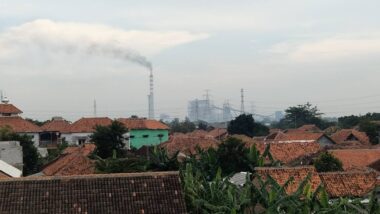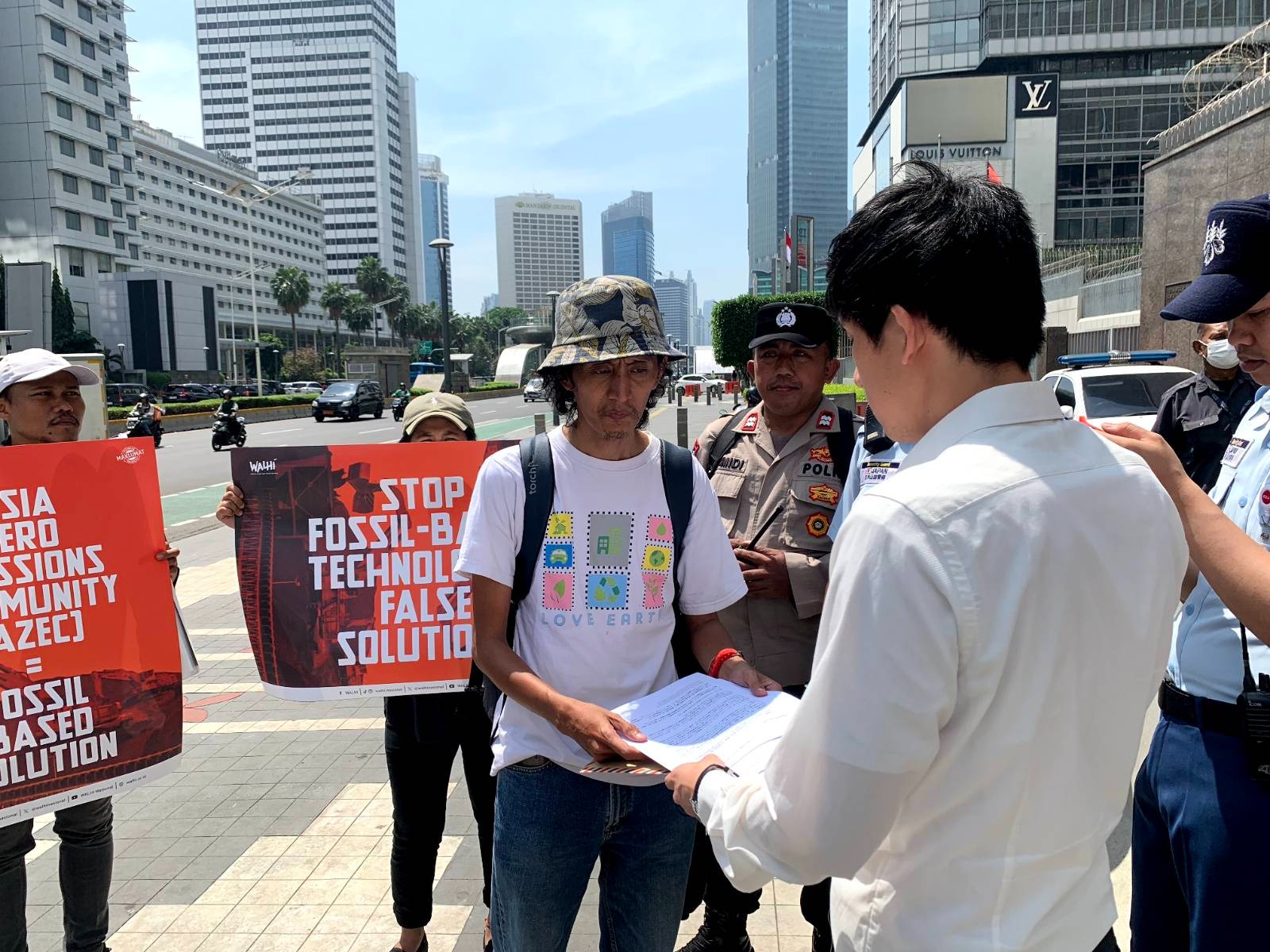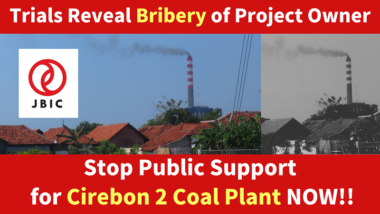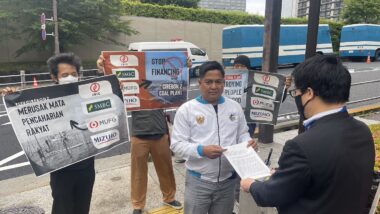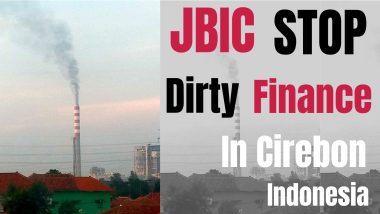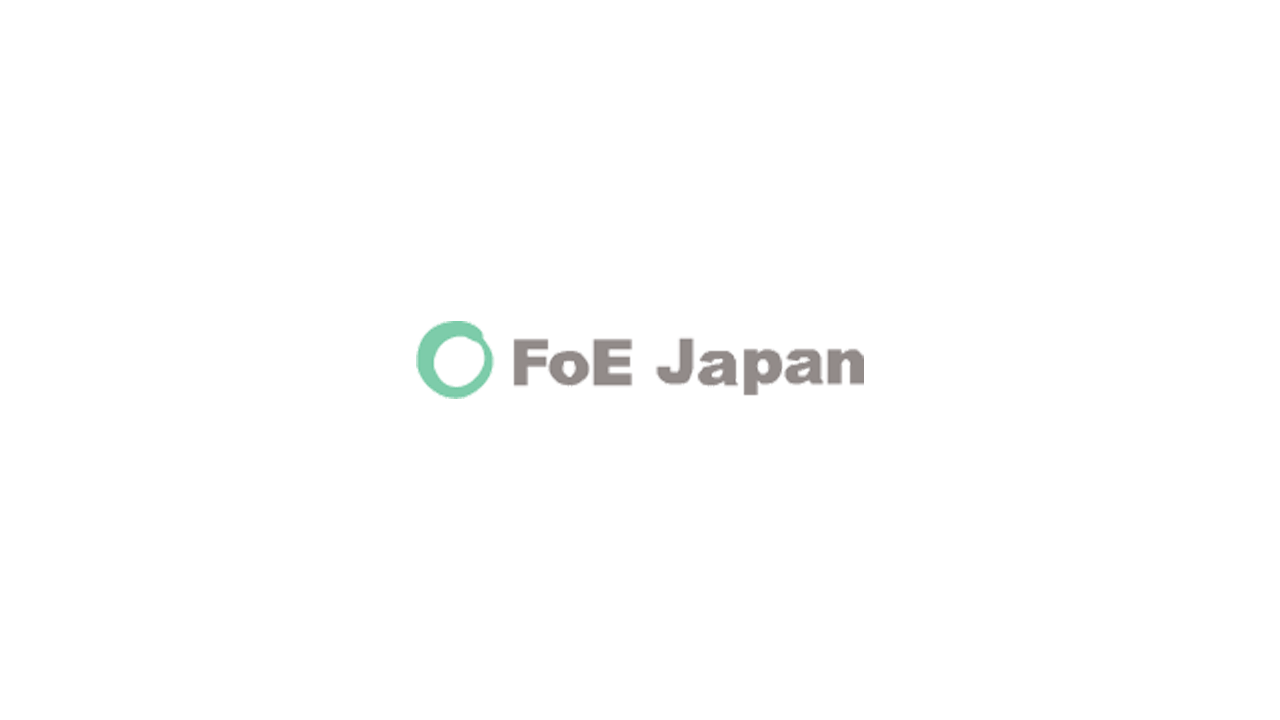- /
- Fossil Fuels/
- Position Paper on the Application of the Energy Transition Mechanism for Cirebon Coal-Fired Power Plant Unit 1 in Indonesia: We firmly reject the mechanism for the sake of huge greenwashing by major corporations, not for the sake of the climate, environment, and local communities
Position Paper on the Application of the Energy Transition Mechanism for Cirebon Coal-Fired Power Plant Unit 1 in Indonesia: We firmly reject the mechanism for the sake of huge greenwashing by major corporations, not for the sake of the climate, environment, and local communities
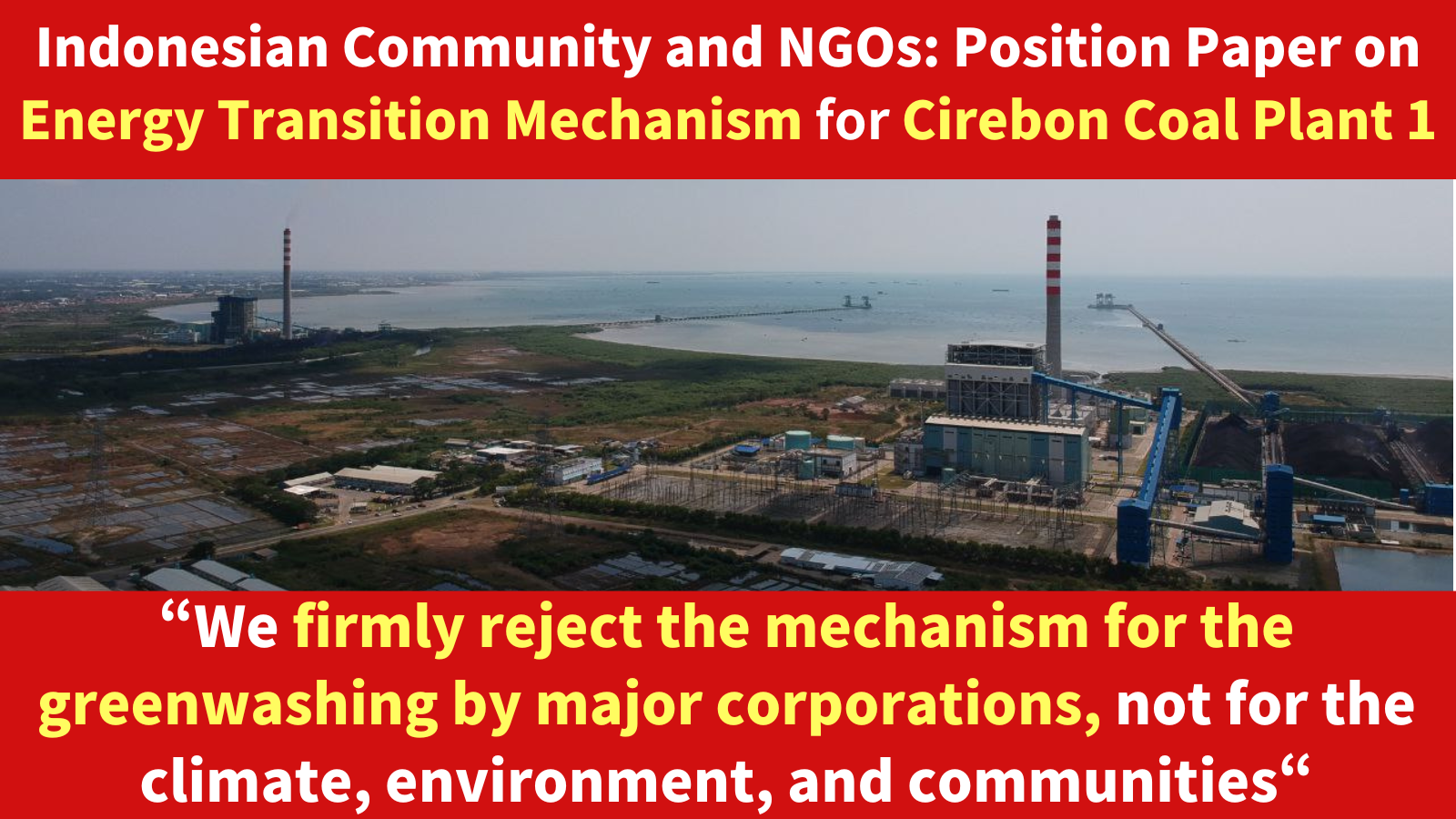
> Click here for PDF
(This is a translation by WALHI West Java- The original document was written in Indonesian. Here is a translation in Japanese)
Position Paper on the Application of the Energy Transition Mechanism for Cirebon Coal-Fired Power Plant Unit 1 in Indonesia: We firmly reject the mechanism for the sake of huge greenwashing by major corporations, not for the sake of the climate, environment, and local communities
February 28, 2024
One year and three months have already passed since the memorandum of understanding (MOU) was signed between the Asian Development Bank (ADB), the Indonesia Investment Authority (INA), PT. PLN (Persero), and Cirebon Electric Power (CEP) on November 14, 2022 on the utilization of ADB’s Energy Transition Mechanism (ETM) for the early retirement of Cirebon Coal-Fired Power Plant Unit 1 (Cirebon 1). However, during this period, civil society, including residents who have been concerned about the problems of the project, has had very limited opportunities to obtain detailed information on how the project will be decommissioned, and has not had any opportunity to participate in the decision-making process in a meaningful way.
Recently, a few relevant documents have finally been made available on the ADB’s website in English only[1]. However, we strongly condemn the fact that the basic framework for how the ETM will be used in Cirebon 1 has already been set up without any opportunity for meaningful participation by civil society in the decision-making process, as described above. The basic framework set forth in those documents is a very far cry from the framework that we believe is necessary for the early retirement of Cirebon 1.
The ETM currently underway at Cirebon 1 does not truly address the imminent climate crisis and lacks appropriate consideration for the local communities that have been severely impacted by the construction and operation of Cirebon 1. On the other hand, the ETM has been full of deceptions that exempt the large corporations that invest in the CEP from taking responsibility for the climate crisis and rather preserve the profits of large corporations. The mechanism, in which the ADB and other public and private financiers provide support to large corporations under the name of energy transition even though it will not lead to a real solution to the climate crisis, is nothing more than a huge greenwashing.
Therefore, we reiterate our firm rejection with any mechanism or process currently underway in the name of energy transition with respect to Cirebon 1.
Our concrete reasons for refusing to participate in the ETM currently underway for Cirebon 1 are as follows:
1. Cirebon 1 must retire as early as possible:
There is no doubt that, given the imminent climate crisis, Cirebon 1 must be decommissioned as early as possible. In addition, considering the severe impact that the construction and operation of Cirebon 1 has already had on local residents in terms of their means of livelihood, such as salt pans and fishing grounds, as well as their health, it is crucial that Cirebon 1 be retired as promptly as possible and that remedial measures for the environmental and social impact, including restoration to its original state, be implemented. It is also apparent that there is no justification for further prolonging the operation of Cirebon 1, given the chronic oversupply of electricity in the Java-Bali power grid, which is expected to continue for the next decade.
Nevertheless, the framework for the early retirement of Cirebon 1, which is currently being implemented using ETM, has already indicated that the early retirement or repurposing of Cirebon 1 in 2035 is a determined matter[2]. In other words, rather than encouraging the earliest possible retirement of Cirebon 1, the framework gives justification for operating Cirebon 1 for a further 11 years, which is far from a framework that we can accept.
2. Preservation of large corporations’ profits by " repurposing" coal-fired power plants using " false solutions to climate change" must be avoided:
As stated above, Cirebon 1 must be decommissioned as early as possible. Repurposing Cirebon 1 with technologies that will extend the life of the coal-fired power plant will only prolong the plant’s impact on local residents and the environment, as well as the impact on the climate. On the other hand, the large companies that have been developing Cirebon 1 will continue to profit from “repurposing" coal-fired power plant even after the early retirement of coal-fired power plant is completed as it should be. A framework for a just energy transition must prioritize local communities, the environment, and the climate, rather than one that preserves the profits of large corporations.
However, according to the relevant ADB documents mentioned above[3], the “repurpose" option is still not ruled out in the discussion of early retirement of coal-fired power plants in the ADB’s ETM. Marubeni Corporation, the largest investor in the CEP, has also referred to “the arrangement of an alternative power source"[4]. The “false solutions to climate change" that the Japanese government and companies are promoting under the Asia Zero Emission Community (AZEC), such as uncertain hydrogen/ammonia and other technology, whether co-firing or fully-firing (100 %), through the framework of coal-fired “repurposing" in the ETM would only bring continued profits to large corporations, and thus, we will not tolerate it.
3. The contradiction between the early retirement of Cirebon 1 and the operation of Cirebon 2 must be resolved:
It is clear to all that it is not justified to start operation of Cirebon Unit 2 (1,000 MW. Cirebon 2), which has higher total greenhouse gas emissions compared to Cirebon 1 (660 MW), while there are discussions to achieve the early retirement of Cirebon 1 due to the urgency of dealing with the climate crisis.
However, the fact that Cirebon 2 began its operation in 2023 is proof that the efforts currently in progress under the ETM for the energy transition in Cirebon 1 are nothing more than a “shell game." A consistent approach to the climate crisis must be implemented at every coal-fired power plant, and Cirebon 2, which is adjacent to Cirebon 1, is no exception. In addition, with the bribery case involving Cirebon 2 becoming widely known, Cirebon 2 must stop its operation, both from the perspective of addressing climate change and from the perspective of its impact on the environment and local communities.
4. Exemption of corporations related to coal-fired power plants, which should become stranded assets, must be avoided:
Large corporations that have been promoting the construction and operation of coal-fired power plants and reaping enormous profits are supposed to take reasonable responsibility for the cost to the climate, the environment, and local communities.
However, it appears that CEP, the proponent of Cirebon 1, is likely to be compensated by ETM’s loan for losses resulting from the shortening of the term of the Power Purchase Agreement (PPA) from August 2042 to December 2035[5]. This is despite the fact that adequate consideration has remained lacking for local communities whose means of livelihood and health have been affected by the construction and operation of Cirebon 1 and 2.
This ETM framework only sends the wrong message to commercial companies that continue to invest in the coal sector that it is possible to avoid liability or risk of stranded assets in the future. In particular, Cirebon Energy Prasarana S.A. (CEPR), the operator of Cirebon Unit 2, has the same President Director and Vice President Director as the CEP, the operator of Cirebon Unit 1, and about half of its management team is the same[6]. The CEPR would continue to operate Cirebon 2 Unit under the 25-year PPA without considering the risk of stranded assets. We firmly reject this unfair and unjust framework for the climate, the environment, and the local communities.
Contact:
Wahyudin – WALHI West Barat (+6282129588964)
Fanny Tri Jambore – WALHI National (+6283857642883)
Aan – Rapel (Rakyat Penyelamat Lingkungan) (+6281212209652)
Dinda Maharani – KARBON (KOALISI RAKYAT BERSIHKAN CIREBON) (+6285942209476)
[1] https://www.adb.org/projects/documents/ino-56294-001-ipsa
[2] Same as footnote 1.
[3] Same as footnote 1.
[4] https://www.marubeni.com/en/news/2022/release/00089.html
[5] Same as footnote 1.
[6] https://www.cirebonpower.co.id/cirebon-power/the-boards/
